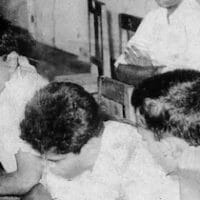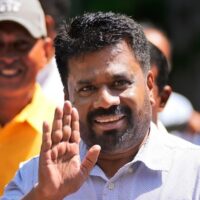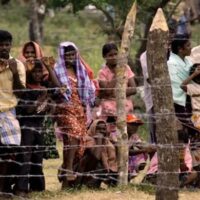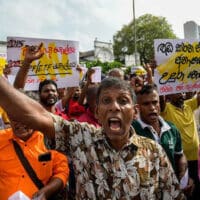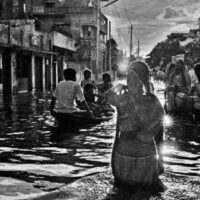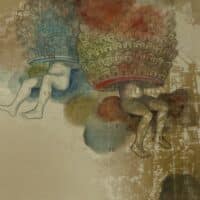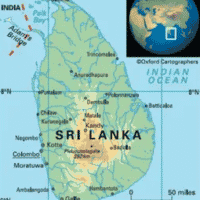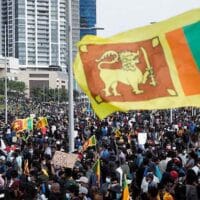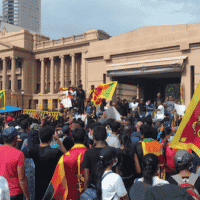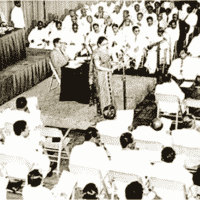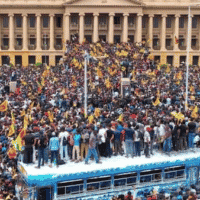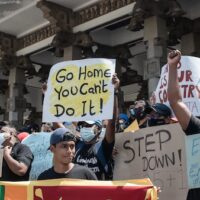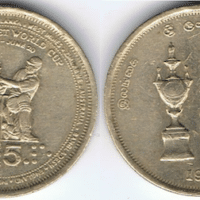-
Left-wing alliance wins two-thirds majority in the Sri Lankan parliament
With the parliamentary victory, the leftist president Anura Kumara Dissanayake is better placed to implement his agenda of economic and political reforms in the crisis-hit country.
-
U.S. Pacific Fleet commander visits Sri Lanka to cement ties with new president
Admiral Steve Koehler, Commander of the U.S. Pacific Fleet, visited Sri Lanka on October 10 in the wake of the election of Anura Dissanayake, leader of the Janatha Vimukthi Peramuna (JVP) and its electoral front, the National People’s Power (NPP).
-
A brief history of the JVP (Peoples Liberation Front) Sri Lanka
The beginning of the left movement in Sri Lanka goes back to 1935.
-
Anura Dissanayake wins: A closer look at Sri Lanka’s first Communist president
The Marxist Janatha Vimukthi Peramuna (JVP) leader’s campaign was built on sweeping reforms, tackling corruption and ensuring economic relief.
-
Capitalism’s permanent horror
Government officials said that they were interested in killing only “terrorists”. But the “terrorists” were supported by most of the population, whom the authorities in fact considered collaborators and fair game.
-
Sri Lanka’s dangerous domestic debt restructuring
The recent bailout agreement between the International Monetary Fund and Sri Lanka fails to address the economy’s structural problems. Instead, it focuses on highly regressive measures that disproportionately affect the working poor and are likely to exacerbate the country’s ongoing debt distress.
-
Pitfalls of export-led growth
AFTER Sri Lanka and Pakistan, Bangladesh has become the third country in our neighbourhood to become afflicted by a serious economic crisis.
-
Sri Lankans seek a World in which they can find laughter together: The Thirty-First Newsletter (2022)
On 9 July 2022, remarkable images floated across social media from Colombo, Sri Lanka’s capital. Thousands of people rushed into the presidential palace and chased out former President Gotabaya Rajapaksa, forcing him to flee to Singapore.
-
Crisis in Sri Lanka: Is U.S. imperialism involved?
The scenes of massive people’s protests that have forced Sri Lankan President Gotabaya Rajapaksa to flee to Singapore have filled the news media. On July 20, Ranil Wickremesinghe, the former prime minister, was appointed interim president.
-
The elephant in the room: geopolitics and the ‘Great Reset’ in Sri Lanka
“But to watch cricket, there has to be a country left for us to watch it in, no?” A fan at the Galle Test Match that ended with an innings victory for Sri Lanka. July 11, 2022
-
Real debt trap: Sri Lanka owes vast majority to West, not China
Sri Lanka owes 81% of its external debt to US and European financial institutions and Western allies Japan and India. China owns just 10%. But Washington blames imaginary “Chinese debt traps” for the nation’s crisis, as it considers a 17th IMF structural adjustment program.
-
Replacing constitutions in a revolutionary struggle
Can the 1978 Constitution of Sri Lanka be replaced without recourse to article 82 of the existing Constitution? In other words, can it be replaced extra-legally and extra constitutionally? Yes, it is possible in certain circumstances.
-
PM resigns, President flees: It’s all happening in Sri Lanka
In the wake of massive protests in Sri Lanka, President Gotabaya Rajapaksa fled his residence. Prime Minister Ranil Wickremesinghe announced his resignation to pave way for an all-party government.
-
Crisis of Sri Lankan capitalism provokes a popular uprising
Since early April, Sri Lanka has been engulfed by a wave of mass protests demanding the resignation of President Gotabaya Rajapaksa. Thousands of workers and students have mobilised in the most significant mass movement in 30 years.
-
Reflections on the Sri Lankan economic crisis
The American establishment and the new cold-warriors of that country put the blame on the Sri Lankan government’s developing close economic relations with China (and we shall no doubt hear much more of it in the coming days); others blame the sheer “irresponsibility” of the government which is accused of “sleeping” when Sri Lanka’s external debt was building up.
-
Reflections on the Sri Lankan economic crisis
The American establishment and the new cold-warriors of that country put the blame on the Sri Lankan government’s developing close economic relations with China (and we shall no doubt hear much more of it in the coming days); others blame the sheer “irresponsibility” of the government which is accused of “sleeping” when Sri Lanka’s external debt was building up.
-
Sri Lankan economic crisis inflicted by self-serving elite
SYDNEY and KUALA LUMPUR: Once deemed a basic human needs success story, Sri Lanka (SL) is now in its worst economic crisis since independence in 1948. Nonetheless, SL’s ‘moment of truth’ now offers lessons for other developing countries.

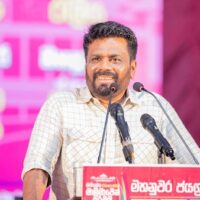
![Commander of the US Pacific Fleet, Admiral. Steven Koehler and Sri Lanka President Anura Dissayanake, October 10, 2024. [Photo: நான் இலங்கையன்]](https://mronline.org/wp-content/uploads/2024/10/1606ea33f2cf6cbcb3259a67bfa1a33fde64d3d7-200x200.jpg)
